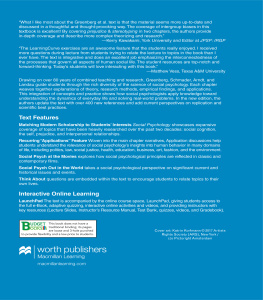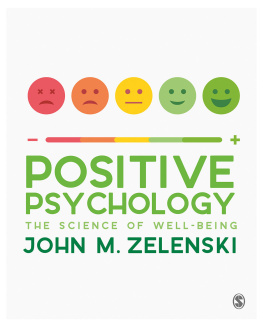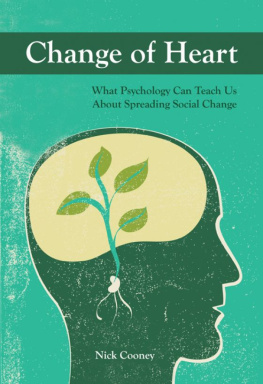
On the top of the Inside Front cover, Macmillan logo is shown followed by text Worth Publishers, Macmillan Learning. Below it, the logo is shown again, followed by text, Learning Curve Macmillan Learning Study Smarter with Learning Curve Text below reads, What is Learning Curve? Learning Curve is a cutting-edge study tool designed to increase your understanding and memory of the core concepts in every chapter. Based on insights from the latest learning and memory research, the Learning Curve s ystem pairs multiple-choice and fill-in-the-blank questions with instantaneous feedback and a rich array of study tools including videos, animations, and lab simulations. The Learning Curve system is adaptive, so the quiz you take is customized to your level of understanding. The more questions you answer correctly, the more challenging the questions become. Best of all, the e-Book of SOCIAL PSYCHOLOGY, Second Edition is fully integrated, so you can easily review the text as you study and answer questions. Learning Curve is a smart and fun way to master each chapter and prepare for your exam. On the right side of the page, two screenshots are shown. The first screenshot shows a page from Learning Curve. A callout to the symbol of a book on the header reads, A link to the e-Book makes it easy to review. The second callout to a text box on the screen reads, Instant feedback allows you to learn as you go. The third callout to the slider at the bottom reads, The activity is over when the progress bar is complete. The fourth callout to a button reads, Stuck on a question? Ask for a hint!
The second screenshot shows another part of the Learning Curve page. A callout to the list on the page reads, The Personalized Study Plan keeps track of your progress on individual topics and links you to videos, tutorials, and other study tools.
Text at the bottom of the page reads, Learning Curve is available as a part of LaunchPad for SOCIAL PSYCHOLOGY, Second Edition. To find out more or purchase access, go to launchpadworks.com.
Social Psychology
The Science of Everyday Life
2e
Jeff Greenberg
University of Arizona
Toni Schmader
University of British Columbia
Jamie Arndt
University of Missouri
Mark Landau
University of Kansas

Vice President, Social Sciences: Charles Linsmeier
Director of Content and Assessment: Shani Fisher
Executive Program Manager: Christine Cardone
Senior Development Editor: Valerie Raymond
Assistant Editor: Melissa Rostek
Executive Marketing Manager: Katherine Nurre
Marketing Assistant: Morgan Ratner
Director of Media Editorial, Social Sciences: Noel Hohnstine
Media Editor: Stefani Wallace
Assistant Media Editor: Nik Toner
Director, Content Management Enhancement: Tracey Kuehn
Managing Editor: Lisa Kinne
Content Project Manager: Won McIntosh
Project Manager: Katie Ostler, Lumina Datamatics, Inc.
Lead Media Project Manager: Eve Conte
Senior Workflow Project Supervisor: Susan Wein
Senior Workflow Project Manager: Paul Rohloff
Photo Editor: Sheena Goldstein
Photo Researcher: Teri Stratford
Director of Design, Content Management: Diana Blume
Cover Design: Vicki Tomaselli
Interior Design: Lumina Datamatics, Inc.
Art Manager: Matthew McAdams
Composition: Lumina Datamatics, Inc.
Cover Art: Katrin Korfmann 2017 Artists Rights Society (ARS), New York / c/o Pictoright Amsterdam
Library of Congress Control Number: 2017948834
ISBN: 978-1-319-06153-1 (EPUB)
2018, 2015 by Worth Publishers
All rights reserved
Worth Publishers
One New York Plaza
Suite 4500
New York, NY 10004-1562
www.macmillanlearning.com
WE DEDICATE THIS BOOK TO
My wife, Liz, and children, Jonathan and Camila, for their love and support throughout the journey.
J.G.
Matt, Hazen, and Ivy. For adding to the sheer joy of everyday life.
T.S.
Stephanie, Nick, and Alexis for their love and support, and my mom and dad for instilling the value of education.
J.A.
For Mom, with gratitude.
M.L.
ABOUT THE AUTHORS

Jeff Greenberg, Ph.D., is a professor of psychology and a College of Science Fellow at the University of Arizona. As a small child growing up in the Bronx, he was very curious about the human propensities for vanity and prejudice. Jeff majored in psychology at the University of Pennsylvania, but it wasnt until he took social psychology in his final semester that he found a field where people were asking the questions he thought should be asked. Soon after starting a masters program in social psychology at Southern Methodist University, he knew this was what he wanted to spend his life studying and teaching. After receiving his M.A., Jeff completed his Ph.D. at University of Kansas in 1982, under the mentorship of Jack Brehm. He has since received numerous research and teaching awards. His research has contributed to understanding self-serving biases, how motivation affects cognition, the effects of ethnic slurs, the role of self-awareness in depression, cognitive dissonance, and how concerns about death contribute to prejudice, self-esteem striving, and many other aspects of social behavior. Jeff has also coauthored or coedited six prior books, including the Handbook of Experimental Existential Psychology and The Worm at the Core.

Toni Schmader, Ph.D., is a Canada Research Chair in Social Psychology at the University of British Columbia. She received her B.A. from Washington & Jefferson College in Pennsylvania before completing her Ph.D. at the University of California, Santa Barbara. Before moving to Canada in 2009, Toni taught at the University of Arizona for 10 years. At the University of British Columbia, she was awarded the Killam Prize for excellence in research, and at the University of Arizona, she received the Magellan Prize for excellence in teaching. Toni has served on the executive committees of the Society for Personality and Social Psychology and the Society of Experimental Social Psychology and as an associate editor at the Journal of Personality and Social Psychology and Personality and Social Psychology Bulletin. She was drawn to research in social psychology for its ability to take a systematic empirical approach to examining important social issues and to teaching for the opportunity to share those insights with others. Her research examines how individuals are affected by and cope with tarnished identities and negative stereotypes. Toni has published work on topics of social identity threat, stigma and identity, stereotyping and prejudice, self-conscious emotion, and gender roles.

Jamie Arndt, Ph.D., is the 2012 Frederick A. Middlebush Professor of Psychological Sciences at the University of Missouri (MU). After attending Skidmore College in the eastern United States for his B.A. and the University of Arizona in the west for his Ph.D., he settled in the middle, accepting a position at MU in 1999. During his time at MU, he has received the Robert S. Daniel Junior Faculty Teaching Award, the Provosts Junior Faculty Teaching Award, the International Society for Self and Identity Outstanding Early Career Award, and the University of Missouri Chancellors Award for Outstanding Research and Creative Activity in the Social and Behavioral Sciences. Jamie is a founding member of the Social Personality and Health Network and former chair of the Society for Personality and Social Psychology Training Committee, and he has served on the editorial boards of various journals in the field. He has authored or coauthored scholarly works pertaining to the self, existential motivation, psychological defense, and their implications for many topics, most notably health decision making, creativity, and legal judgment.
Next page















